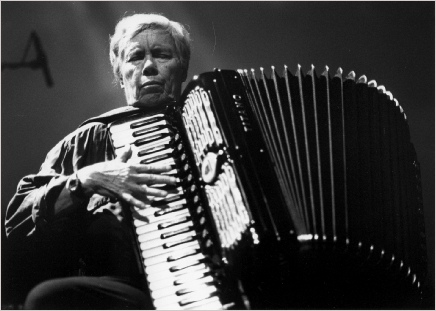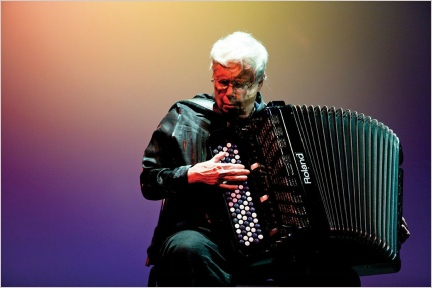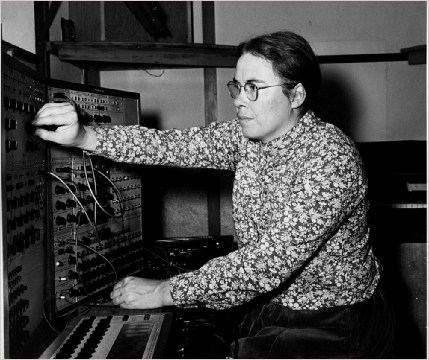Another Timbre TimHarrisonbre
at207 Pauline Oliveros ‘Sound Pieces’
Six chamber works played by Apartment House
1 ‘Quintessential’ (1996) 6:11 Youtube extract 1
3 ‘Horse sings from cloud’ (1975) 7:23
4 ‘From unknown silences’ (1996) 6:45
6-12 ‘Tree/Peace’ (1984) 41:44 Youtube extract 2
We wanted to include an alternative realisation of ‘Quintessential’ for two instrumental groups, but there wasn’t room on the CD. This additional track is available as a download for free. Email us at info(at)anothertimbre(dot)com & we’ll send you a file.
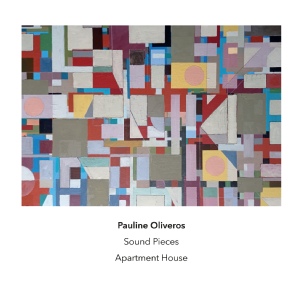
Pauline Oliveros (born 1932) was one of the pioneers of experimental music in the USA from the 1960’s until her death in 2016. She was a composer, teacher, writer, improviser and accordionist. In the 1960’s she focused mainly on electronic music, as a founding member and director of the San Francisco Tape Music Center, which later became the Center for Contemporary Music at Mills College. In 1981, in order to escape a sense of being creatively constrained in academic environments, she left her post as Professor of Music at the University of California, San Diego, and relocated to upstate New York to become an independent composer and performer. She had already begun to formulate new music theories, and investigate ways of focusing attention more closely on music, giving rise to her concepts of ‘sonic awareness’ and ‘deep listening’. She understood the act of listening as a kind of healing ritual or meditation, but this doesn’t mean that her music is always gentle or pacific. She wrote several books, including Roots of the Moment, Deep Listening and Sounding the Margins, and worked with countless musicians in improvisations and realisations of her own scores, as well as those of many others. The Deep Listening Institute continues to promote her music and ideas.
Interview with Anton Lukoszevieze about
Pauline Oliveros’s music
You suggested doing a CD of Pauline Oliveros's music, and I was initially sceptical because I hadn't heard many realisations of her pieces that I liked. I feel you've proved that my scepticism was misplaced, but why did you want to record these pieces?
Before I answer that, I only knew Pauline by correspondence; some 20 years ago she created for me a solo work based on personal astrology, which I subsequently lost in a flood in my old studio, much to my shame and sadness. But maybe it was a sign that I would engage with her work later with Apartment House? Her large body of work and the development of her deep listening practice are obviously monumental in the history of experimental music, but I wanted to focus on some of the many musical compositions that she left. I wanted to record some of these works as a means to explore them and see how they sounded! People talk too much about music, I want to hear it. Life is not a workshop or a conference, it should be steeped in live performance and action, and a lot of it.
I worry that some of Oliveros's text scores are so unspecific that they could go in any direction - good and bad - and that too much is being left to the interpreting musicians. Apartment House could probably take a page torn at random from a telephone directory and make something musically interesting from it, but do you feel that there's more craft to her scores than I'm suggesting?
Nearly all her scores are textual, apart from a few that contain some fragments of musical notation, often rhythmic in nature. All of the ones we recorded were textual, apart from Tree/Peace which is entirely constructed of pitch material plus interpretive instructions.
A score is a question, an interpretation an answer. Some questions are good (or indifferent) and the same for some answers. I hope we succeeded in the latter. Text scores sometimes leave open a field of many possibilities, and are actually quite difficult to create successfully, I think. But I hope that the scores that I chose are successful as there is a variety; some are quite structural (such as Quintessential) and others much more open and subjective (Horse Sings from Cloud). Her scores seem to attend to a process of listening in the moment and having the courage to make individual decisions, which change the course of the music. The music becomes like a stream of musical consciousness, but underpinned with a strong internal dialectical logic. Often for me, the key to performing such works is to listen and not listen, to react and not react, to be serious or absurd. One must also be attentive to one’s instrument, to feel that connection with the creation of musical sound. But essentially, it is about creating something new, through the score, not attending to habits or cliches, hopefully. I wanted to be surprised by her compositions and I think I was, that’s it!
The shorter, textual pieces on the CD were recorded after some discussion, but with little or no rehearsal, so they obviously have that ‘live’ quality you describe, of listening and taking decisions in the moment. But a lot of Apartment House recording sessions retain some quality of ‘liveness’, even when you’re playing fully scored works. You’re not just following a score, but are working together to make the piece ‘happen’ and come alive in the moment.
Many of us in the group have been playing together for many years, so I think a lot of that ‘liveness’ stems from an unwritten familiarity of approach to interpreting the music, but also adding certain instrumental methods, subtle nuances of timbre, non vibrato (mostly, but not exclusively) and a certain objective yet highly sensitive way of playing the music, letting sounds be sounds but moulding and shaping them in connection with others. I think that, when confronted with a text score, musicians often just improvise in some loose and vague way, as if that is enough to create the musical intentions of the composer/score. I believe that sounds do have an inner life, character and impetus that Pauline is focusing on in these works, through the medium of group performance and consciousness. I think that too much rehearsal and discussion could dampen those aspirations, hence the necessity of a certain ‘liveness’ to our recordings of this and other music. I hope that is the result, of course.
Tell us about Tree/Peace, which turned out to be by some way the longest piece on the CD. It’s a far more substantial piece than I’d imagined. The trio had rehearsed the day before the recording, but did the music surprise you too?
It did surprise in the sense that I thought perhaps it would be wilder and have more disparate and improvised sections. There are elements of those things, at times, but what struck me was the highly constructed pitch structure of the piece and an almost formalist approach. But the magical ‘undoing’ of these things is her text introduction, which I won’t quote here, whereby the pitches (the notes) are constantly in a state of flux and merge/emerge out of instrumental sounds (improvised) and timbral fluctuations. The unfolding of each part also felt ‘right’ and unhurried, which is probably why the duration became longer than we had envisaged.
Tree/Peace has seven movements, all with titles relating to the life cycle of a tree (see below). At the recording session we discussed whether to include these titles on the CD cover. In the end I felt that as a listener, having programmatic titles acted as a limitation on the way I would hear the music, and I’d rather experience it without those prompts. But presumably you, Mark and Mira took account of the titles, and were to some extent directed by them when playing?
Indeed, we did discuss the titles and they do bear relation to our interpretations of each section, but not in a totally literal way. I think some of the descriptive elements are quite subtle, in our performance, but I like to think they go to the heart of the matter. One has to create a certain poetry with music, and holding up a sign each time that there is a stylistic change is perhaps not the most subtle approach… Trees are enigmatic in many ways and also complex microsystems that exist on many different levels.
For those who do want to know, the titles of the seven movements of Tree / Peace are:
1 – The Mystery of Propagation
2 – The Growth of the Seedling
3 – The Full Formation and Maturity of the Tree
4 – The Action of the Seasons
5 – The Magical Nature of the Tree
6 – The Death of the Tree
7 – Contemplation
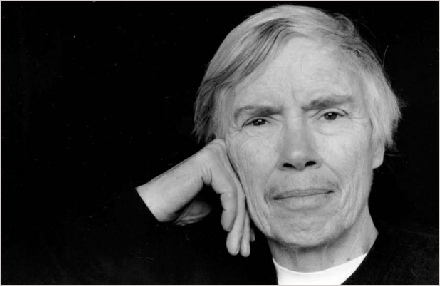
Pauline Oliveros
